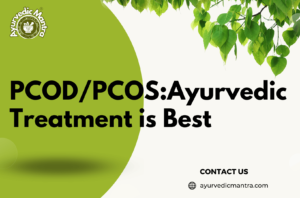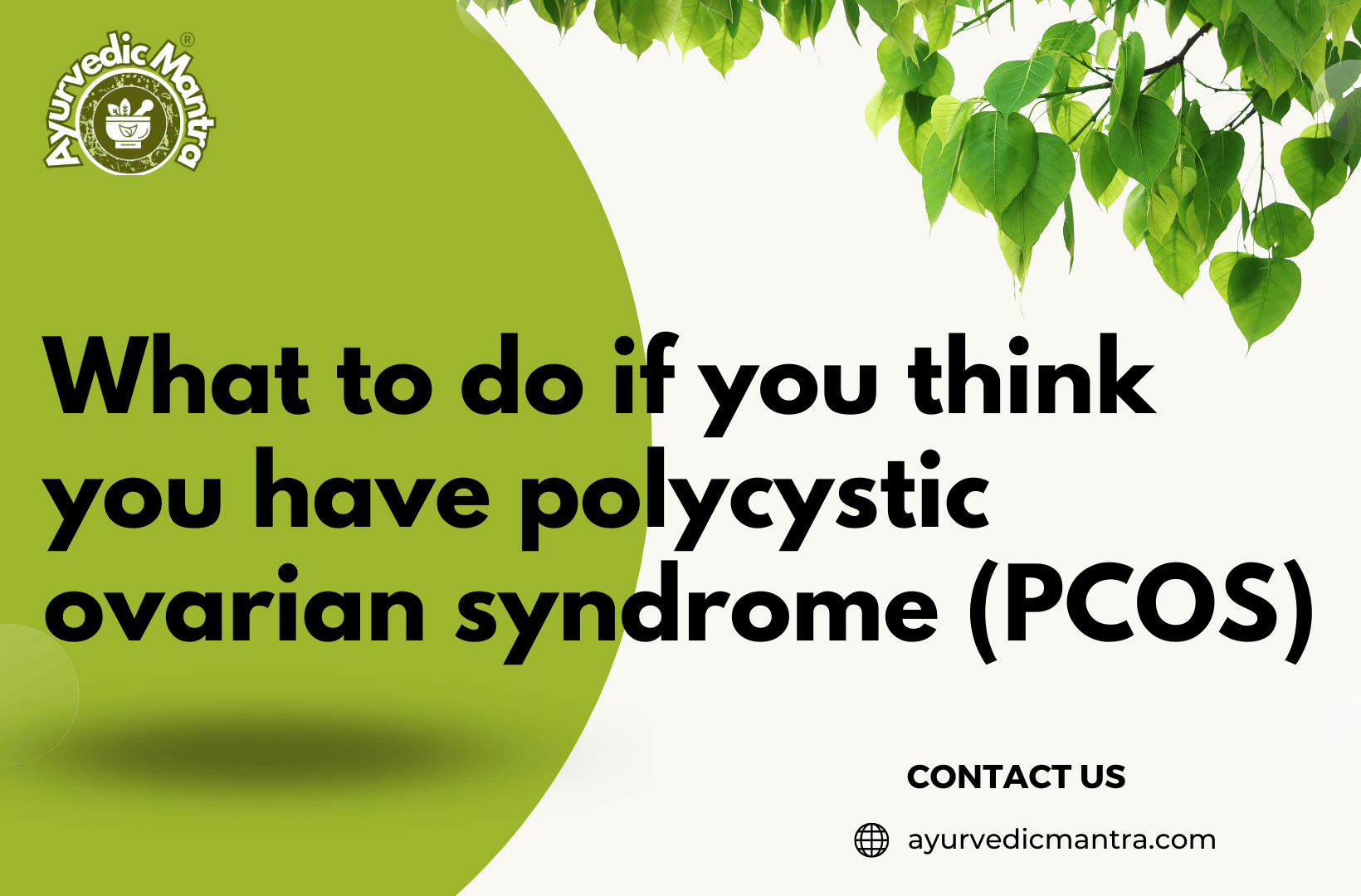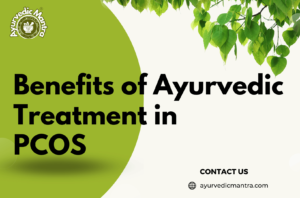
PCOD/PCOS: Ayurvedic Treatment is Best
Introduction Polycystic Ovary Disorder (PCOD) or Polycystic Ovary Syndrome (PCOS) is a common endocrine disorder affecting millions of women worldwide. It leads to hormonal imbalances,

Polycystic Ovarian Syndrome (PCOS) is a common hormonal disorder that affects many women of reproductive age. Various symptoms characterize it, including irregular menstrual cycles, excessive hair growth, and cysts on the ovaries. If you suspect you might have PCOS, educating yourself about the condition and taking appropriate steps is essential. In this article, we’ll discuss the signs of PCOS, its potential causes, and what you can do if you think you have this condition.
One of the hallmark signs of PCOS is irregular menstrual cycles. If you notice that your periods are inconsistent, with varying cycle lengths or missed periods, it could indicate PCOS. Tracking your menstrual cycle and noting any irregularities can help you and your healthcare provider in the diagnosis process.
Another common symptom of PCOS is hirsutism, which refers to excessive hair growth in areas where men typically grow hair, such as the face, chest, and back. This can be distressing for many women and may impact self-esteem. If you are dealing with unwanted hair growth, it’s essential to bring it up with your doctor.
PCOS can also lead to skin issues, including acne and oily skin. Hormonal imbalances associated with PCOS can contribute to the development of acne, particularly along the jawline and chin. Managing these skin concerns might require a multifaceted approach, including skincare routines and, in some cases, medical interventions.
If you suspect you have PCOS based on the signs and symptoms you’re experiencing, it’s crucial to seek professional medical advice. While you can gather information online, only a qualified healthcare provider can diagnose accurately. They will conduct a thorough assessment, including a physical examination, blood tests, and a review of your medical history.
Making dietary changes is often a key component of managing PCOS. A diet rich in whole grains, lean proteins, and plenty of fruits and vegetables can help regulate insulin levels and support weight management, essential for PCOS management. Additionally, reducing processed foods and sugars can positively impact hormonal balance.
Regular physical activity benefits overall health and can also play a role in PCOS management. Exercise helps improve insulin sensitivity and promotes weight loss, which can alleviate some of the symptoms of PCOS. Aim for a combination of aerobic exercises, such as walking or cycling, and strength training.
Stress can exacerbate the symptoms of PCOS by influencing hormone levels. Incorporating stress-reduction techniques into your daily routine, such as yoga, meditation, or deep breathing exercises, can help manage the impact of stress on your hormonal balance.
Hormonal birth control methods, such as birth control pills, patches, or hormonal IUDs, can help regulate menstrual cycles and reduce androgen levels. They can also help control acne and excessive hair growth. Consult with your healthcare provider to determine the most suitable option for you.
Anti-androgen medications are often prescribed to manage symptoms like hirsutism and acne. These medications block the effects of androgens, the hormones responsible for these symptoms. Your doctor will assess whether this treatment is appropriate for your condition.
Fertility treatments may be considered for women with PCOS struggling with fertility issues. These treatments can include ovulation induction medications or assisted reproductive technologies like in vitro fertilization (IVF). Your healthcare provider will guide you through the options based on your needs.
If you suspect you have polycystic ovarian syndrome (PCOS), taking proactive steps toward diagnosis and management is essential. Understanding the signs and symptoms, seeking professional medical advice, making lifestyle modifications, and considering appropriate medical interventions can all contribute to effectively managing the condition. Remember, early detection and personalized care are vital to maintaining your health and well-being when dealing with PCOS.
Polycystic Ovarian Syndrome (PCOS) is a common hormonal disorder that affects the reproductive system of individuals with ovaries. Various symptoms characterize it, including irregular menstrual cycles, excessive hair growth, acne, and cysts on the ovaries. PCOS is a complex condition that can significantly affect a person’s health and well-being.
The exact cause of PCOS is not fully understood, but it is believed to involve a combination of genetic and environmental factors. Insulin resistance and hormonal imbalances, particularly elevated levels of androgens (male hormones), play a significant role in developing PCOS. Genetics, lifestyle factors, and obesity can also contribute to the risk of developing PCOS.
Diagnosing PCOS involves a comprehensive evaluation by a healthcare provider. The diagnosis is typically based on the presence of specific criteria, which may include irregular menstrual cycles, elevated androgen levels, and the appearance of cysts on ultrasound imaging. Other conditions with similar symptoms must be ruled out before a definitive diagnosis.
Yes, PCOS can impact fertility. Irregular ovulation and hormonal imbalances associated with PCOS can make it more challenging for individuals to conceive naturally. However, with appropriate medical interventions and treatments, many individuals with PCOS can achieve successful pregnancies. Fertility treatments, such as ovulation induction and assisted reproductive technologies, may be recommended for those trying to conceive.
PCOS management involves a multifaceted approach tailored to individual symptoms and needs. Lifestyle modifications, including adopting a healthy diet, engaging in regular physical activity, and managing stress, can help regulate hormonal imbalances and improve overall well-being. Medications like hormonal birth control and anti-androgen medications may also be prescribed to manage specific symptoms.
There is no cure for PCOS, but effective management strategies can help control symptoms and improve quality of life. Early detection and ongoing medical care are essential for minimizing the impact of PCOS on health. People with PCOS can lead healthy and fulfilling lives with proper treatment and lifestyle adjustments.
Yes, weight loss can have a positive impact on PCOS management, particularly for individuals who are overweight or obese. Losing even a modest amount of weight can improve insulin sensitivity, regulate menstrual cycles, and reduce androgen levels. A healthcare provider can guide safe and effective weight loss strategies for individuals with PCOS.
PCOS is associated with an increased risk of several long-term health complications, including type 2 diabetes, cardiovascular disease, and endometrial cancer. Proper management of PCOS, including lifestyle modifications and regular medical check-ups, can help mitigate these risks and promote overall health.
Lifestyle modifications, such as adopting a healthy diet, staying physically active, and managing stress, can play a significant role in PCOS management. For some individuals, these changes alone may be sufficient to alleviate symptoms and improve hormonal balance. However, medication and medical interventions may be necessary to address specific symptoms and optimize health outcomes.
Regular medical check-ups are essential for individuals with PCOS to monitor their overall health and assess the effectiveness of their management plan. The frequency of visits may vary depending on individual needs and treatment strategies. It’s recommended to work closely with a healthcare provider to determine an appropriate schedule for follow-up appointments.

Introduction Polycystic Ovary Disorder (PCOD) or Polycystic Ovary Syndrome (PCOS) is a common endocrine disorder affecting millions of women worldwide. It leads to hormonal imbalances,

Introduction Losing weight is a journey that requires dedication, consistency, and self-care. While there are numerous weight loss techniques out there, not all of them

Polycystic Ovary Syndrome (PCOS) is a hormonal disorder that affects millions of women worldwide. It can lead to various health complications, such as irregular periods,

In recent years, Ayurveda, an ancient system of natural healing originating from India, has gained significant popularity as an alternative approach to treating various health

आजकल वजन बढ़ने और चर्बी की वृद्धि होने की समस्या एक आम समस्या बन गई है। बढ़ते वजन और अतिरिक्त चर्बी के कारण न केवल

प्रस्तावना: आजकल वजन बढ़ने और ओबेसिटी की समस्या एक आम समस्या बन गई है। बढ़ते वजन के कारण न केवल शारीरिक समस्याएं होती हैं, बल्कि
